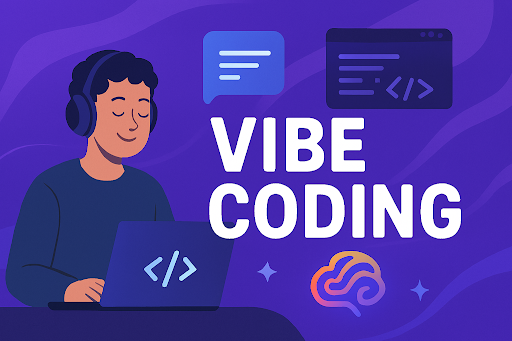Welcome to the Era of 'Vibe Coding'
10/04/2025

Imagine coding without stressing over syntax or boilerplate.
Just describe what you want, and boom — the code writes itself.
Sounds like magic? Welcome to the world of vibe coding.
In recent months, devs across Twitter and LinkedIn have been buzzing about this new way of building software — where you code more by feel than by hand, and AI handles most of the details.
In this post, we'll unpack:
- What vibe coding actually is
- Where it came from
- How tools like ChatGPT and Copilot make it real
- Why devs are hyped (and a little scared)
Expect memes, real-life stories, and a casual tone — so grab a drink, and let's vibe in.
1. So... What Is Vibe Coding?
At its core, vibe coding is about letting AI handle the grunt work so you can focus on what you actually want to build.
Instead of writing everything from scratch, you describe your goals in plain English — and the AI fills in the code.
"I want a form with three inputs and a submit button. Also, make it look clean."
...and the code just appears.
One definition puts it like this:
"A new approach to software development that uses AI tools to help people create applications without needing deep programming knowledge."
In other words:
You set the vision. The AI writes the code.
2. Where Did the "Vibes" Come From?
The spark? A tweet from AI researcher Andrej Karpathy in early 2025.
He described a coding style where he just:
"sees stuff, says stuff, runs stuff, copy-pastes stuff"
...and lets AI do all the work.
No keyboard smashing. No reading diffs.
He even used voice-to-code with tools like Cursor and SuperWhisper.
"I just embrace the vibes and forget the code exists."
That tweet exploded. Memes followed.
People started calling it vibe coding.
Even Rick Rubin got dragged into it — "patron saint of vibe coding."
No coding skills, just legendary taste.
"Vibe coding is easy. Vibe debugging is hard."
Which... is kinda true.
3. The Rise of the AI Coding Sidekick
What made this possible?
AI coding tools got ridiculously good.
Over the past couple of years, tools like:
- GitHub Copilot
- ChatGPT
- Cursor
- Replit Ghostwriter
...evolved from autocomplete helpers to full-on code sidekicks.
They can now:
- ✅ Turn plain English into code
- ✅ Generate pages, components, APIs
- ✅ Debug
- ✅ Write tests
- ✅ Even run or lint your code
You can literally say:
"Add error handling and turn this into a REST endpoint."
...and watch it happen in real time.
4. Why It Feels So Different
It's not just that AI is powerful — it's that it feels different.
"Vibe coding" feels like jazz.
Like jamming with a band.
Instead of planning every detail:
- You try something
- See the result
- Tweak it
- Repeat
The process is creative. Instinctive. Fast.
One founder built an MVP in a weekend using ChatGPT.
They didn't even know what stack was used until the AI explained it later.
It's about speed, creativity, and momentum.
5. Why Devs Love It
Here's why this trend exploded:
🚀 Wild Speed
Ship an MVP in a day, not weeks.
🧠 Creative Flow
Forget syntax. Focus on ideas.
🤝 More Accessible
Non-devs can build stuff too. AI bridges the gap.
😎 It's Just Cool
You're literally saying: "I built this with ChatGPT."
It's a little chaotic, a little magical — and people love it.
6. But Wait — There's a Catch
Yup, the vibes come with a price.
🐞 Vibe Debugging is Brutal
When it breaks, you didn't write it.
Debugging is like decoding alien logic.
🧠 Losing Skills
Letting AI take over = coding muscles atrophy.
⚠️ Risky for Production
Missing tests. Sloppy patterns. Unpredictable behavior.
📦 Messy Codebases
AI-generated files can pile up fast and get hard to manage.
Vibe coding is awesome for prototyping —
but it's not (yet) a replacement for good engineering.
7. The Bottom Line
Vibe coding is real, and it's here to stay.
You don't need to know every tool or syntax.
You just need to know what you want.
But don't get lazy.
Test. Refactor. Learn how it works under the hood.
🎯 Takeaway
Use vibe coding to explore, prototype, and jam —
but don't forget how to actually play your instrument.
Balance vibes with skill, and you'll build cool stuff faster —
and have way more fun doing it.
Now go:
See stuff.
Say stuff.
Run stuff.
May the vibes be with you.